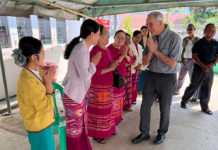Be kind
EDITOR: Some thoughts on my participation in the County of Sonoma’s “Day of Caring” last week. Once a year county employees can choose to volunteer to help out in their community.
I would have loved to have been outside cleaning up a creek, but I misread the form and ended up cleaning someone’s house. Well, not just someone. An older couple who are struggling financially and physically. What I want to say about the experience, which was at the same time depressing and uplifting, is that it is really true that a small act of kindness goes a long way.
We were an odd team of three; we had never met, came from different backgrounds with different life experiences, but we were all willing to work hard, really hard without complaint. And we did not solve any huge problems, did not have a magic wand to wave over this crumbling trailer.
But we scrubbed, we decluttered, we pushed a clunky carpet cleaner on frayed carpet over and over, we folded laundry, we hauled away bag after bag of garbage, we got to know this family a little and we reminded them that they are not alone, at least for today. Sounds corny, but it’s true. Be kind out there, y’all.
Maya Missakian
Healdsburg
Write to water board
EDITOR: Property owners along the Russian River who have older septic systems, cesspools, etc. are encouraged to write to the North Coast Water Quality Control Board.
The board proposes to accept, at its December meeting, scientific evidence for the impairment of the river’s waters for recreation (swimming, kayaking, etc.) by various sources of pathogens (agriculture runoff, homeless encampments, poor septic systems, etc.) and to adopt an action plan for the reversal of that pollution. That plan, with regard to septic systems, or OWTS (onsite water treatment systems), within 600 feet of a riverbank, would then be subsequently implemented by new regulations drawn up and enforced by the Sonoma County Permit and Resource Management Department (PRMD).
The Fitch Mountain Association has been involved as a stakeholder in this process since 2013, as a member of a group representing “the legacy non-sewered-riverfront communities of the lower Russian River” and including historical and professional expertise in the wastewater area. We have met many times with the water board, PRMD, and our local supervisors (James Gore and Lynda Hopkins), to whom we are now an advising body.
After studying every relevant document, the group we belong to has sent a letter (text and documentation on our website, www.fitchmtn.org) in which we:
Cite the water board’s own evidence that, according to the EPA’s scientific criteria, the main stem of the Russian River is not, in fact, impaired for recreational uses; and therefore;
Question the justification for requiring advanced protection onsite wastewater treatment systems for systems in that 600-foot band along the river, since installing such systems will have significant financial burdens out of all proportion to a level of pollution that does not seem to exist;
Suggest, instead, a “light touch” action plan that replaces cesspools with a low-cost alternative, and allows septic system-owners to take advantage, for five years, of the county’s current, relatively low-cost voluntary upgrade system, which will, in fact, improve the quality of the river, but at a much lower cost to the owner;
Call for adequate funding, through loans or grants, for feasible community or multiple lot systems.
We hope that local riverside residents will write a letter, before the Sept. 29 deadline) to the water board and others (addresses are in our website letter).
Dave Henderson
President, Fitch Mountain Association
The real deal
EDITOR: Two weeks into the “no net water increase” deal on Knights Bridge Winery made with Sonoma County supervisors, cement trucks enter lower property for construction of a new swimming pool supplied by wells pumping from the riparian zone of Bidwell Creek. Meanwhile, neighbors’ wells are going dry. Looks like the real deal is to increase rather than decrease water use.
We assume supervisors consider public benefits versus public harm in permitting new discretionary wineries, including assessing environmental damage or in this case, continuation of damage. They assume we’ll forget they ignored the public interest.
Aug. 22 appeal hearing begins with announcement that the file is closed. Each side is allotted 20 minutes. Opposition speaks first, without knowledge of before-hearing negotiations or undisclosed new permit filings.
Then, when moments count, timer is on, set before opponent is ready. Clearly being rushed since decision is already made, the show becomes obvious when Chair Supervisor loudly and unnecessarily interrupts opponent’s presentation.
Of note is Second District Supervisor saying later, “I didn’t learn anything,” referring to hearing the public’s concerns. In comparison, I learned a lot: some deals aren’t real and this group has no concept or concerns regarding water usage, conservation and scarcity.
Millie Bisset
Knights Valley
46.5
F
Healdsburg
April 19, 2025








